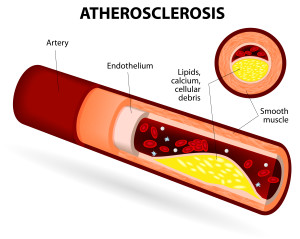Hypothyroidism: A Major Risk Factor for Heart Disease
Heart disease is the number one killer of both men and women. When most people think about protecting their heart, hypothyroidism is probably not the first word that comes to mind. After all, how often have you heard that hypothyroidism is a risk factor for heart disease? Probably never.
Did you know that untreated or undertreated hypothyroidism can lead to fatal heart disease? Here are two ways that hypothyroidism leads to heart disease:
1. Mucin Deposition
Mucin is a glue-like substance that is a normal part of your immune system and is present in your tissues. However, hypothyroidism causes an abnormal accumulation of mucin in your connective tissues. The result is swelling that eventually spreads to all your tissues, including your heart. The heart, which also contains connective tissue, is seriously affected by hypothyroidism, and mucin leads to injury of the arteries.
As tissues become engorged with mucin, heart function slows, which leads to a weak and wounded heart, unable to pump blood efficiently. This is also known as congestive heart failure. Additional difficulties in the heart arise with the accumulation of mucin, such as atrial fibrillation, palpitations, and an increase or decrease in heart rate.
It has been documented that treatment of an enlarged heart using natural thyroid supplementation reduces the tissues to normal size, however, if the treatment is stopped then mucin again increases rapidly.
2. Inflammation
The second reason hypothyroidism can increase your risk for heart disease is that individuals with low thyroid function have an increased incidence of infection and inflammation. It is well documented in medical literature that coronary artery disease begins with an inflammatory process that damages the coronary arteries.
The thyroid is responsible for the body’s metabolism. Normal thyroid metabolism helps to prevent recurrent infection and chronic inflammation. Your body’s natural defense against inflammation is to produce antioxidants to fend off dangerous free radicals that create oxidative damage in your body. A slow metabolism not only affects the efficiency of the central nervous system, cardiovascular and skeletal systems, and kidneys and hormone producing tissues, it also affects the rate at which antioxidants are produced. The result is that few antioxidants are left to minimize the effects of free radicals. This leaves your arteries and blood vessels open to further attack, leading to atherosclerosis.
The Hypothyroidism-Heart Disease Connection
Dr. Broda Barnes’ extensive research clearly reveals the association between hypothyroidism and heart disease. He noticed that his patients who were being treated for hypothyroidism had a remarkably lower rate of heart attacks. This led Dr. Barnes to conduct a 20 year study of the relationship between supplemental thyroid hormone and a reduced risk of heart attacks.
He was fortunate to have a landmark study against which to compare the heart attack rate in his own patients: the Heart Disease Epidemiology Study, also known as the Framingham Study, which began in 1949 under the sponsorship of the National Heart Institute and which continues to this day. In this study, five thousand residents of Framingham, Massachusetts, were selected to be followed medically for the rest of their lives in order to determine the cause of heart disease. Each person was followed with annual medical examinations and blood work. Their diets, smoking habits, and lifestyles were documented. However, these patients did not receive supplemental thyroid hormone.
In 1970, Dr. Barnes had 1,569 patients on natural thyroid hormone who were observed for a total of 8,824 patient years. These patients were classified by age, sex, elevated cholesterol, and high blood pressure, and compared to similar patients in the Framingham Study. Based on the statistics derived in the Framingham Study, seventy-two of Dr. Barnes’s patients should have died from heart attacks; however, only four patients had done so. This represents a decreased heart attack death rate of 95 percent in patients who received natural thyroid hormone – a truly amazing finding.
Studies have also clearly demonstrated the benefit of supplemental thyroid hormones in patients who have had hypothyroidism and angina. Not only is the angina improved in more than 90% of the patients, but the death rate is decreased. Unfortunately, mainstream medicine is ignoring the impact that treating hypothyroidism can have in preventing heart disease.
Thyroid production declines as we age. Fifty-year-olds produce one half the thyroid hormones that they made during their twenties. If you are experiencing symptoms of hypothyroidism, then why not consider using natural thyroid hormone supplementation to reduce your risk of heart disease?
Take our symptom checker health quiz to find out if you could have symptoms of hypothyroidism that could affect your heart disease risk.


darlene delvalle
I have been hypothyroid for about 25 years. Is armour product no longer sold to the public? Any info would be appreciated.
Hotze Team
Dear Darlene,
There was a shortage of Armour Thyroid a few years ago, however it is still on the market. Another option is compounded desiccated thyroid. We compound this at Hotze Pharmacy (http://www.hotzepharmacy.com). Thank you for your comment!